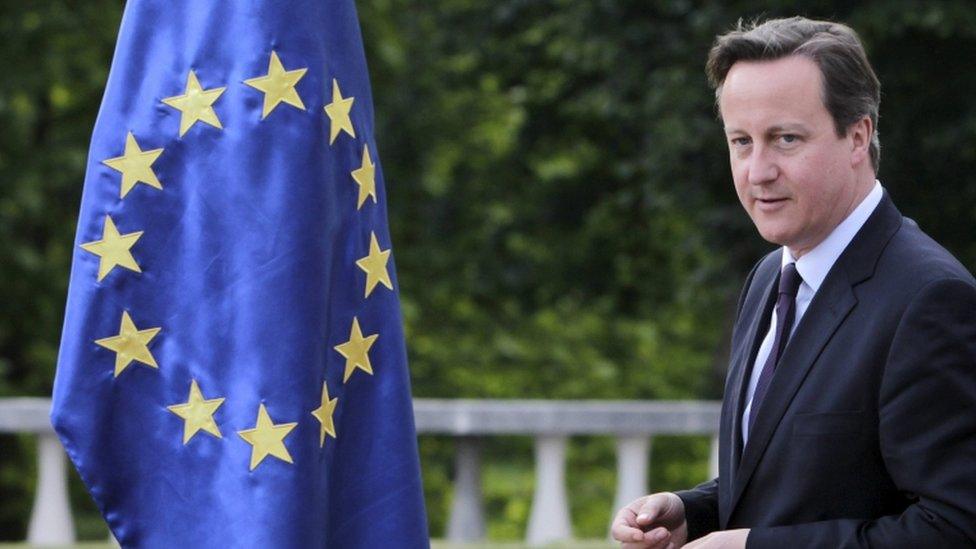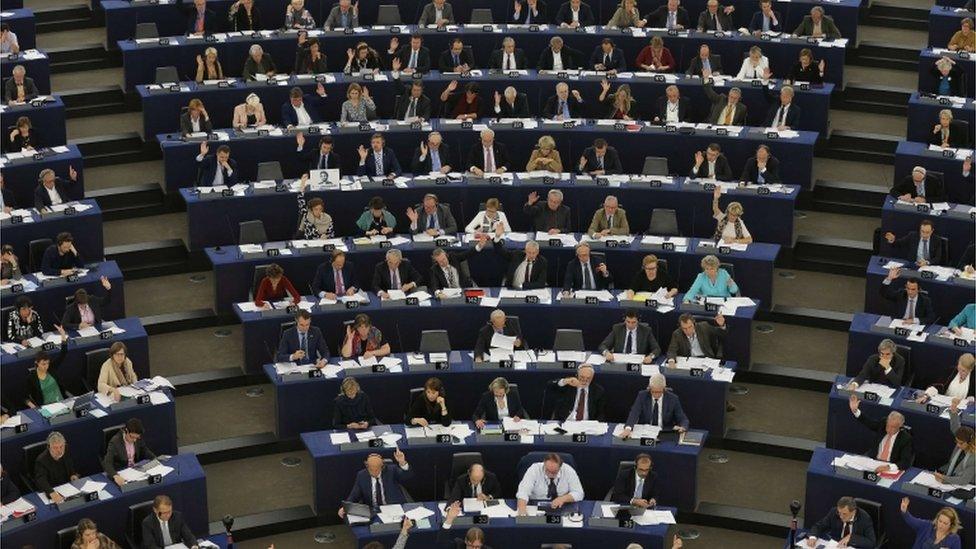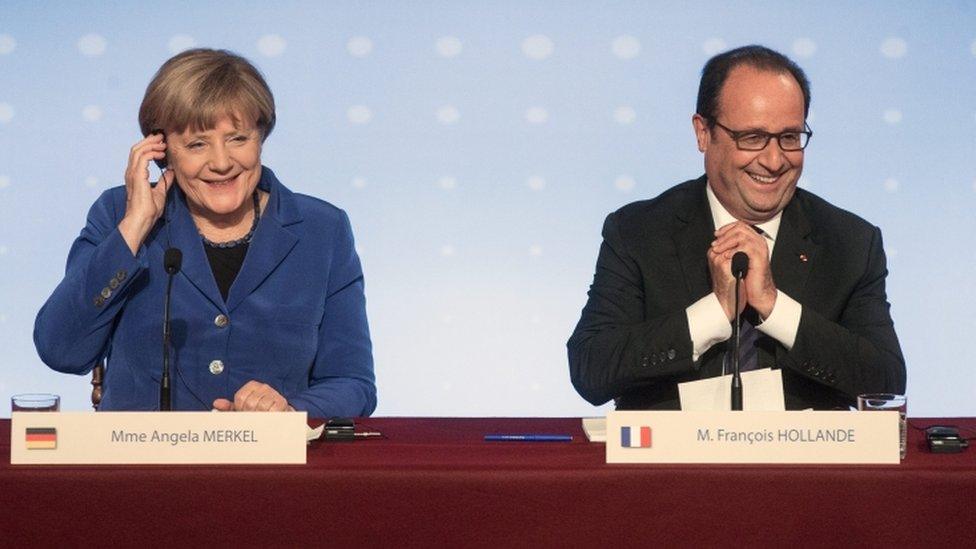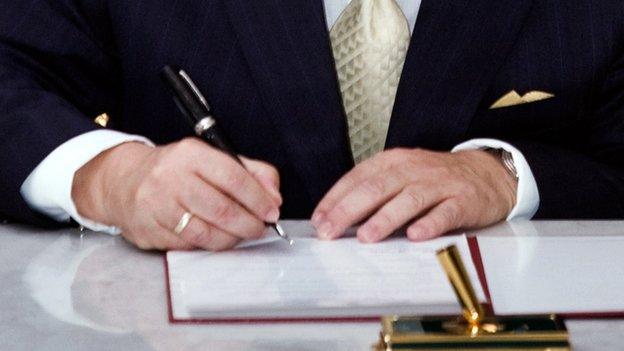Europe waits for Cameron to show his hand
- Published
- comments

It is all a bit of a drama, the British renegotiation, and what I want to know is: Where is the wow factor? What is the twist? How does David Cameron stun us all with a surprising denouement and persuade those reluctant to stay in the EU that it is worth it after all?
He has begun to make his case, in Iceland,, external that Britain should not give the EU the cold shoulder and go it alone.
To find out where we are heading, I have been not north but south, to Strasbourg and the European Parliament.
Europe's politicians are more phlegmatic - even cynical - about this latest drama.
One member of the European Parliament compared David Cameron's act to a Beckett play: "We're waiting for Cameron. But Cameron never turns up."
Like the characters "waiting for Godot", European politicians undergo anticipation, frustration, irritation, boredom and the occasion for philosophising about the meaning of it all.
Many regard the British debate as a distraction, an unwanted wilfully created crisis in the middle of a time of crisis - over the euro, Ukraine and above all migration.
Unlike Godot, the British prime minister will eventually have to become visible.
He may or may not agree to the parliament's request to hear from him in person, but he will be centre stage at the pre-Christmas summit of presidents and prime ministers in Brussels.
Soon, they and the rest of us will know what he wants.
He has had, very reluctantly, to promise to reveal his demands in a letter at the beginning of next month.
The prime minister's worry is that critics at home will tear into the modesty of his demands before he has even got an agreement, that they will portray his bargaining position as totally inadequate.
Indeed, they have already started.
Fig leaf
Mr Cameron has already given a teaser, at the Conservative conference.
He said: "Britain is not interested in 'ever closer union' - and I will put that right."


MEPs seem to be relaxed about the UK negotiations
What the Conservative 2015 election manifesto said on Europe:
"The EU is too bureaucratic and too undemocratic. It interferes too much in our daily lives, and the scale of migration triggered by new members joining in recent years has had a real impact on local communities.
"We say, 'Yes to the single market. Yes to turbo-charging free trade. Yes to working together where we are stronger together than alone. Yes to a family of nation states all part of a European Union but whose interests, crucially, are guaranteed whether inside the euro or out.
"'No to 'ever closer union'. No to a constant flow of power to Brussels. No to unnecessary interference. And no, of course, to the euro, to participation in eurozone bailouts or notions like a European army.'"

His Foreign Secretary, Phillip Hammond, revealed another demand, external - a formal acknowledgement of "a multi-currency Europe of pounds, kroner and forints as well as euros".
I had wondered whether MEPs would be horrified and feel that such concessions would mean a fundamental change to the nature of the European Union.
Of course, there is a wide range of views - but little dismay.
The reaction ranges from active support to mild distaste, but there is a general willingness to give Mr Cameron this fig leaf if he really wants it.
There would be lot of debate about the exact form - is it a clarification of an optout for Britain or something more general, a formalisation of a Europe not just of different speeds but different destinations?
Perhaps the most typical response I heard was: "A lot of effort for little reward."
The Dutch, who are next in the hot seat of the European Council presidency, are already immersed in the detail of another demand, for a "red card", external - that would allow eight parliaments working together to block a plan from the commission. It is a beefed up version of the rarely used "yellow card", external procedure.
If these things come to pass, they would demonstrate a certain direction of travel. But they hardly make me fall off my seat, or seem designed to change hearts and minds.
Associate membership
So I come back to the wow factor - what does Mr Cameron wring from the rest of Europe that fits his definition of a new relationship with the European Union?
The Sun floated this week the idea, external of "associate membership", an idea, I am told, that the foreign secretary has run past senior European politicians as his favoured option.
It could be a way of formalising a fact. While for years people have been talking with fear or admiration of a "two-speed Europe", the reality is that Europe is already multi-speed.

German Chancellor Angela Merkel and French President Francois Hollande are two of the key players on the European stage
It is clear when you look at the European Union's multiple crises, that Britain is an irrelevant spectator at the top table - or to look at it another way, it has escaped damage because it has not taken part in certain bits of European integration.
The Greek euro crisis? Obviously the UK is outside the single currency.
Mass migration across the continent? Britain is not in the Schengen Agreement that does away with borders.
Taking in a quota of refugees? We have an optout from that in the Maastricht treaty.
Ukraine? Slightly different because the UK is an important guarantor of that country's status, but Mr Cameron was not invited to a discussion with Russian President Vladimir Putin hosted by German Chancellor Angela Merkel and French President Francois Hollande.
So could "associate membership" simply be sticking a fancy label on a box containing a ragbag of optouts? A couple of questions quickly occur.
Would this be a British exception or a club anyone could join?
If the UK intentionally or accidentally created a new group, for nations discontented with the general direction of the European Union, then other European leaders might be less than happy.
A bigger question for Britain would be whether "associate membership" carried with it a loss of formal influence - would it be cut out of certain councils, have voting rights and strengths reduced?
I will be reporting more on this story in BBC Radio 4's World This Weekend programme on Sunday, 1 November, at 13:00 GMT.
- Published30 December 2020

- Published1 February 2016

